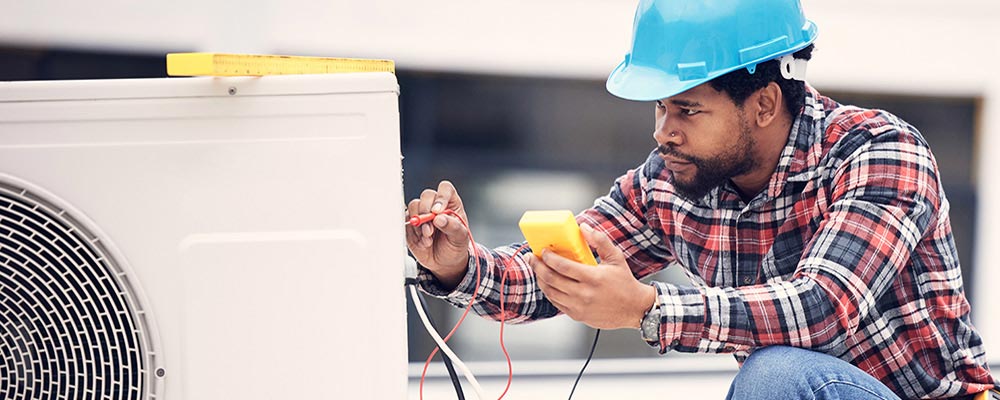Heating, Ventilation, and Air Conditioning (HVAC) Installer
Work with your hands (and cool tools) in a high-value, high-demand trade.

Job Details
Typical Tasks
- Install electrical and mechanical equipment at both residential and commercial buildings
- Perform routine preventative maintenance and repairs on heating, ventilation, and air conditioning (HVAC) equipment
- Inspect and test HVAC equipment to diagnose any problems
- Reference manufacturer’s specifications to ensure proper system functionality
- Communicate information with customers and coworkers, especially around safety and project timelines
Typical Skills
- Strong mechanical skills
- Critical thinking and problem-solving skills
- Ability to safely work with hand and power tools
- Ability to work in small, confined spaces
- Strong communication skills
- Ability to safely lift up to 50 pounds
Typical Experience or Education
- Employers may require a high school diploma or equivalent
- Many employers like to see vocational school training, a related associate’s degree, or previous on-the-job training
- If you have not completed a relevant program at a vocational school, 1–2 years of previous work experience in heating, ventilation, and air conditioning (HVAC), plumbing, electrical, construction, or energy efficiency can help get your foot in the door
- Knowledge of relevant machines and tools
- Previous workplace safety training and experience is a plus
Professional Development Opportunities
Some Heating, Ventilation, and Air Conditioning (HVAC) Installers may choose to advance their skills with professional certifications, such as:
- North American Technician Excellence (NATE) Certified HVAC Professional (CHP-5)
 : This certification demonstrates your in-depth knowledge of HVAC systems, equipment, and safety practices.
: This certification demonstrates your in-depth knowledge of HVAC systems, equipment, and safety practices. - Environmental Protection Agency (EPA) Section 608 Technician Certification
 : This test certifies that you understand the important safety protocols for working with the refrigerant fluids that are common in heat pumps and other air conditioning units.
: This test certifies that you understand the important safety protocols for working with the refrigerant fluids that are common in heat pumps and other air conditioning units. - Building Performance Institute (BPI) Air Conditioning & Heat Pump Professional
 : BPI certification shows that you are committed to environmental safety and energy efficiency in your work as an HVAC Installer.
: BPI certification shows that you are committed to environmental safety and energy efficiency in your work as an HVAC Installer.
Jenny’s Unlikely Start as a Heat Pump Installer
See how Jenny transitioned to a new HVAC career (which she loves!) after she realized her previous jobs in healthcare and law enforcement were not working out for her.
See how you can grow your career and earn more money when you start as an HVAC Installer.
HVAC Installer
Wage Range:
$39,000–$99,000
Median Hourly Wage:
$31.10/hr
HVAC Service Manager
Wage Range:
$47,000–$126,000
Median Hourly Wage:
$37.42/hr
HVAC Contractor
Wage Range:
Varies by type of work, size of projects, and other factors
How to Start Your Career
-
Free Online Courses
Explore Courses Free Online CoursesTake a free online beginner course. Start by exploring NYSERDA's directory of free courses.
-
Apply for Internships
View Internships Apply for InternshipsApply online for paid internships with a New York State company.
-
Find Participating Employers
Participating Employers Find Participating EmployersResearch employers in your area that offer paid internships, on-the-job training, or fellowship opportunities.
-
Virtual Career Center
Visit Career Center Virtual Career Center (opens in new window)Check out New York State Department of Labor’s Virtual Career Center to explore jobs and training opportunities.
-
SUNY Programs
SUNY Colleges SUNY Programs (opens in new window)Check your local State University of New York community college for programs that can help you specialize in energy-efficient building systems.
-
CUNY Programs
CUNY Colleges CUNY Programs (opens in new window)Check your local City University of New York college for programs that can help you specialize in energy-efficient building systems.
